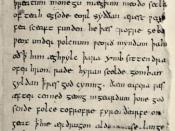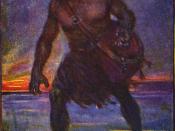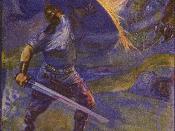"Do help your son if you can! Go to Olympus, pray to Zeus if you have ever pleased him and served him by word or deed!...See if he will help the Trojans and drive the Achaians back to their ships with m slaughter!" (The Iliad pg. 18) Homer composed the Iliad in order to relate the tale of Achilles, an Athenian Hero who fought in the Trojan War. Throughout the poem, one can see aspects of the ancient Greek culture, like Gods, Goddesses, and supernatural events explained by mythology. Literature is greatly affected by the historic events that surround their authors. Therefore, in periods like the Anglo-Saxon period, one can appreciate how the life style of warring tribes, pagan societies, and the beginnings of Christianity, affected poems such as "Beowulf", translated by Burton Raffel, "The Seafarer", translated by Burton Raffel, and "The Wanderer", translated by Charles W. Kennedy.
Religion was one of the main aspects of life in the Anglo-Saxon period. Due to the fact that at the time Heathenism was very strong, as well as Christianity, one can find a "blend" of these two reflected in Anglo-Saxon literature. Some examples that reflect this aspect of Anglo-Saxon history can be found in poems like "Beowulf". Beowulf is a poem about a Geat warrior who is constantly fighting forces of great evil. The religious beliefs of the time are reflected since the very beginning of the poem. "Recalling the Almighty making the earth, shaping these beautiful plains marked off by oceans, then proudly setting the sun and the moon to glow across the land and light it." (Lines 7-10) Here one can notice how strong were their beliefs in God, by the respect and admiration with which they refer to him, and how he created the world, sun...


